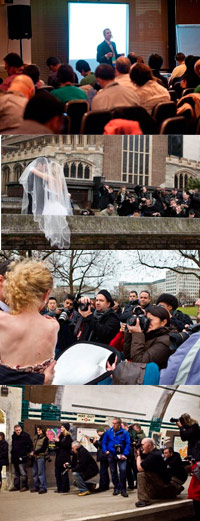Why Learning is not a Spectator Sport
 Training. There is just no substitute for it.
Training. There is just no substitute for it.
The spectacular advances in digital capture technology in recent years have led to many an aspirational photographer wrongly assuming it's easy to turn pro in the twenty first century. They need to be aware that ;here be dragons;. Such an assumption really is tantamount to entering dangerous territory. Today's consumers are increasingly discerning. More than ever before they are hunting down quality, originality, creativity and professionalism. They might not know what an f-stop is, but they really would like to think that you do. Too many photographers now are neglecting basic principles. Those same fundamentals that successful professionals have relied on for years.
Here at The Societies we never stop banging the drum about training. It's a business cost but it's also an investment. It is the commercial DNA - the common thread running through the aspirations, ambitions and ultimate success of all serious imagists. It is only through the acquisition of real technical skill and business competency that photographers can sensibly and rationally plot their future career paths. And it's only against this background of experience and education that future leaders, icons and ambassadors of the imaging industry are honed. Our own workshops, seminars and widely acclaimed Mentor programmes (in which member photographers can have professional appraisal of their work by an expert) support our extensive and comprehensive qualifications curriculum. Photographers with distinctions not only show their peers their work has reached high standard but more importantly qualifications attained through training are the leverage photographers need when it comes to charging. They are the differentiator.
Professional photographers understand the key dual challenges of high quality and consistency. And to achieve consistency it is essential to learn the fundamentals.
These include: lighting, composition, technique, camera craft, people skills and postproduction plus all of the elements that denote a professional product.
Additionally, to improve business skills it is absolutely essential that photographers understand marketing, sales, customer services and finance.
Information is readily accessible from academic courses offered by universities; books, tutorial DVDs, workshops, seminars and from industry benchmark events such as The Societies’ annual January Convention in London.
When it comes to courses it is important for delegates to know precisely what will be taught and by whom. If that information is not forthcoming questions should be asked.



